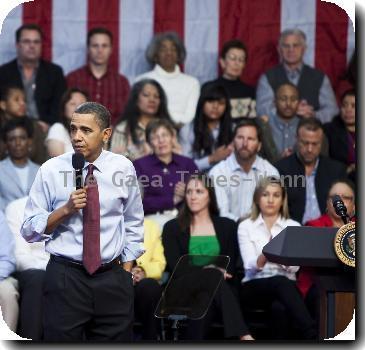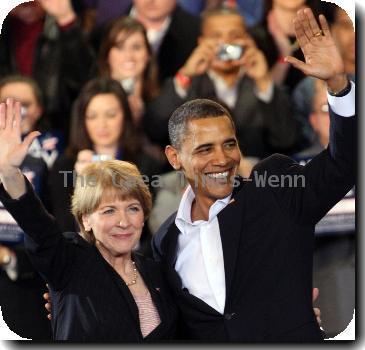Kremlin, US officials: US, Russia reach agreement on ‘all documents’ for nuclear arms cuts
By Robert Burns, APWednesday, March 24, 2010
New US-Russia nuclear treaty all but sealed
WASHINGTON — After long and trying negotiations, the U.S. and Russia have reached agreements for a historic new treaty to reduce the nuclear arsenals of the former Cold War rivals, officials said Wednesday. President Barack Obama and Russian President Dmitry Medvedev are expected to sign it in Prague.
The deal is widely seen as an important step toward rolling back global nuclear dangers and sealing a new level of trust and cooperation between the U.S. and Russia. All but small technical details have been cleared away, officials in both Washington and Moscow said.
Obama and Medvedev are expected to seal the deal when they talk by telephone this week, setting the stage for a White House campaign to win Senate ratification. The treaty also must win approval by the Russian Duma, and the two legislative processes are likely to take months.
Though the State Department said the two countries were still working out unspecified final details, spokesman Mark Toner said the two sides were “extremely close” to completing the agreement. He said there had been discussions with the Czech government about holding a signing ceremony in Prague — where Obama last April declared his vision of a nuclear-free world.
In fact, Czech officials went ahead and announced that Prague would host the signing. They did not give a date.
The new agreement to reduce long-range nuclear weapons would replace the 1991 Strategic Arms Reduction Treaty, which expired in December. An important feature of the new deal is that it includes a mechanism for verifying that each side complies — an element that was absent from a 2002 deal, known as the Moscow Treaty, that accelerated the weapons reductions laid out in the 1991 treaty.
The Moscow Treaty set limits on both sides’ strategic nuclear warheads at between 1,700 and 2,200. The new deal, whose provisions have not been made public, is expected to lower that to about 1,500.
Obama spent an hour Wednesday in the White House briefing Democratic Sen. John Kerry, chairman of the Senate Foreign Relations Committee, and Sen. Richard Lugar, the committee’s ranking Republican. Both would play major roles in ratification of the emerging treaty.
Kerry said he and Lugar would hold hearings to examine details.
“A well-designed treaty will send an important message to the rest of the world that America is prepared to lead efforts with key stakeholders to reduce the threat of nuclear weapons,” he said.
Two senior U.S. officials in Washington said the technical issues still to be resolved were in an “annex” to the main treaty, and they foresaw no hurdles to completing the entire deal within days. They spoke on condition of anonymity due to the sensitive discussions. One official said an announcement that the treaty is complete is expected Friday.
White House press secretary Robert Gibbs and a Kremlin official said a final agreement was not likely until Obama and Medvedev speak again. Gibbs said they last spoke about the treaty March 13.
A Kremlin source, speaking by telephone to The Associated Press, said all the documents, including the treaty, had been agreed upon. Russian Foreign Minister Sergey Lavrov said last week that the treaty was 20 pages long, with an extensive protocol attached.
The Russian ambassador to Prague, Alexey Fedotov, told Czech President Vaclav Klaus the date for the signing, which will be released later, Klaus’ office said.
Obama shook hands with Medvedev last summer on plans to reduce sharply both countries’ nuclear stockpiles. The two leaders had hoped to enshrine the new limits in a replacement for the 1991 START accord, but that treaty expired in December as the talks dragged on.
Negotiations, which have been under way in Geneva, have been centered on disputes over verification measures and Russia’s objection to U.S. missile defense plans for Europe.
Russian negotiators have balked at including some intrusive weapons verification measures in the new treaty. The Obama administration has warned that without these, Senate ratification could prove difficult.
The agreement would still leave each country with a large number of nuclear weapons, both deployed and stockpiled.
The expired START treaty, signed by Soviet President Mikhail Gorbachev and President George H.W. Bush, required each country to cut its nuclear warheads by at least one-fourth, to about 6,000, and to implement procedures for verifying that each side was sticking to the agreement. The 2002 Moscow Treaty lowered the warhead limit to 1,700 to 2,200.
__
Associated Press writers Mark S. Smith, Desmond Butler, Matthew Lee and Jennifer Loven in Washington and Karel Janicek in Prague contributed to this report.
Tags: Barack Obama, Czech Republic, District Of Columbia, Eastern Europe, Europe, International Agreements, John Kerry, Moscow, North America, Nuclear Weapons, Prague, Russia, United States, Vaclav Klaus, Washington, Weapons Administration, Weapons Of Mass Destruction

